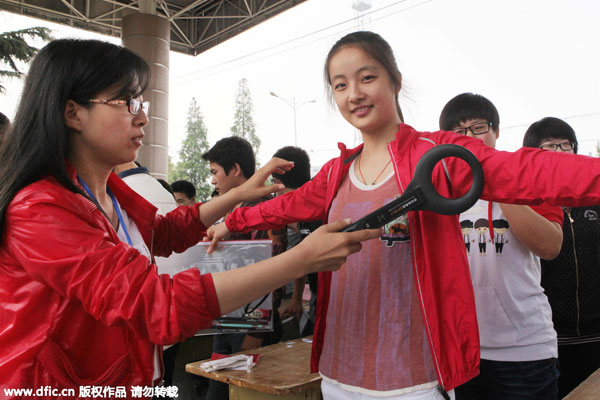Gang who helped students cheat graduate exam lose court appeal


A Beijing court has rejected an appeal from two people convicted of using high-tech equipment to help students cheat in China's national graduate exam.
Zhang Zongqun and Li Qian were sentenced along with four others at Haidian district people's court in the summer. Zhang received two years and 10 months in prison, while Li was given 22 months.
Unsatisfied with the verdict, the pair filed an appeal with Beijing No 1 Intermediate People's Court, which on Thursday upheld the original ruling.
"Our review found that the judgment was based on sufficient evidence and clear facts," the court said in a statement. "The penalties given to the six defendants were reasonable and in line with Criminal Law."
According to Criminal Procedure Law, courts are required to review the cases of every individual convicted of a group offense — as these six defendants were — even if only one of them appeals.
In August, Zhang and Li were found guilty alongside Zhang Wuya, Lyu Shilong, Zhang Xiayang and Zhang Feng of using wireless transmitters and receivers to provide answers to 33 graduate students taking a graduate exam in Beijing in Dec 2016.
Zhang Wuya, 33, the ringleader, was sentenced to four years in prison. The group also received fines ranging from 10,000 to 40,000 yuan ($1,460 to $5,840).
The case was said to be the largest involving organized cheating in the capital since China's Criminal Law was amended in 2015, when it was made illegal to help students cheat or hire someone to take their place in a national exam.
After the appeal hearing on Thursday, Zhang Wuya, who appeared in court, said, "I knew helping others cheat in a national exam was wrong, but I didn't think it would be a crime."
Zhang Wuya, a native of Hunan province, used to run a technology and educational company in Beijing. In November 2016, he got his five accomplices to recruit students and teach them how to use the wireless equipment ahead of the test.
"I've accepted my sentence, as it was I who organized the cheating system," he said on Thursday.
At the time of the crime, his wife and accomplice Li, 33, was a postgraduate student at China University of Political Science and Law.
Ruan Chuansheng, a law professor at the Shanghai Administration Institute, said helping people cheat in exams "seriously harms social credibility" and deserves strict punishment.
Under the law, people who organize such activities face up to seven years in prison.





































